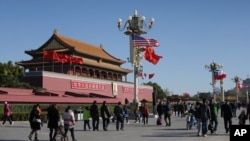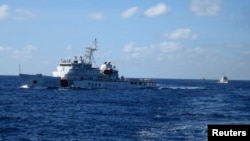China’s rise as an economic power has been predicted for years. But by some measures 2014 was the year that the country overtook the United States as the world’s biggest economy. It happened sooner than many expected.
According to figures released by the International Monetary Fund, China's total output of goods and services pushed past the United States' total for the first time this year.
However, inside China there are many who view the prospect of being the world’s economic leader as a burden.
“China is not eager to be number one or number two and even number two happened so quickly,” said Wang Yiwei, a political scientist at Beijing’s Renmin University. Wang made his remarks at a recent gathering for foreign journalists hosted by the U.S. Embassy’s Beijing American Center.
Wang said that Chinese leaders, and scholars like himself, thought it would take China a long time to become number two, but it didn’t. Four years ago, China surpassed Japan to become the world’s second biggest economy.
And “that’s the reason our relationship with Japan is so bad,” he added.
Territorial tensions
It is not just Beijing’s relations with Japan that have deteriorated. China’s long-standing territorial disputes escalated in 2014. A massive Chinese oil rigger that was parked off Vietnam’s coast triggered deadly riots there and seriously frayed relations between the two Communist nations.
Relations with Manila also continued to be strained as Beijing asserted its claims in waters close to the Philippines.
There is growing concern in the region that China’s territorial claims, and what some argue is its aggressive stance, could lead to conflict as its global clout grows.
Bruce Jacobs, a professor at Australia’s Monash University, said China’s expansionist territorial policies posed dangers because they were being stoked in an authoritarian country that lacks freedom of the press.
“There is no discussion or apparently private discussion of many of these issues,” he said. “There is no feedback on these sort of false policies that the government puts forward. So in some ways it is very dangerous.”
But Victor Gao, the director of the China National Association of International Studies, argued that “having territorial disputes is normal,” and that “it should not be alarming.”
“If you look around the world, involving many countries in the world, there are territorial disputes," he said. "Even today, among European countries, the U.K. and Spain have territorial disputes, and Russia and Norway, for example, just recently signed a maritime treaty, even between Canada and U.S., and several other countries, have territorial disputes involving the Arctic interests.”
Some analysts, however, suggest that as China looks to the past to assert what it sees are its rightful territorial claims, it should perhaps put more emphasis on its future interests.
“The interests of a superpower are different from that of an average big nation,” said Peking University professor Jia Qingguo. “A superpower is not concerned about whether it has more or less territory, it is more concerned about access.”
Developing superpower
This year, while most nations distanced themselves from Russia, relations between Beijing and Moscow warmed. At the same time, China was reaching out to other neighbors in the region and beyond.
China has put increasing effort into extending its contacts with Central Asia. In November, Beijing announced the establishment of a $40 billion Silk Road Fund. It is also working on a Maritime Silk Road that aims to boost China’s presence in the South China Sea and on the Malacca Strait to India, the Middle East and Africa.
China is sending more troops for United Nations peacekeeping missions in Africa. Nearly 2,000 troops are in South Sudan, where Chinese companies have major oil interests. It is also increasing its contributions in the fight against the deadly Ebola virus.
Washington and Beijing have agreed to work together to fight climate change and China participated for the first time this year in joint naval exercises with the United States.
“I think it is time for China to come up with new ideas, new paradigms, new ways of approaching many of these new challenges in diplomacy that we are talking about,” said Victor Gao. “I think President Xi Jinping is doing exactly that, he is changing the way China positions itself in the world and dealing with the multiple challenges we are facing diplomatically."
As China adapts to its growing status in the world, it is increasingly being looked to as the world’s next superpower. But that can be a daunting challenge for the nation’s leaders.
“China is a developed and developing nation. It’s a rich and poor nation. It is a weak country and a strong country. An average big country and superpower,” explained professor Jia Qingguo.
“This duplicity of status has an impact on its interests because the interests of a developed and developing nation are not the same, or not entirely the same. Nor are they for a rich and poor nation.”
Too big to fail
As Xi reasserts China’s foreign policy abroad, there are increasing worries over his consolidation of power at home. China’s president has assumed power more quickly than any other Chinese leader since Deng Xiaoping in the wake of the country’s deadly and costly Cultural Revolution.
Xi is carrying out a massive crackdown on corruption, while also spearheading government efforts on national security, cyber space and economic reform.
His consolidation of power was something that U.S. President Barack Obama highlighted earlier this month in a Business Roundtable address.
“Everybody has been impressed by his [Xi Jinping] clout inside of China after only a year-and-a-half or two years," he said. "He taps into a nationalism that worries his neighbors and that we’ve seen manifest in these maritime disputes in the South China Sea as well as the Senkaku Islands.”
The president also added that there were dangers in such a quick rise, particularly when it came to issues of human rights and clamping down on dissent.
China has detained and jailed a growing number of activists, journalists and online commentators over the past year. Many, such as Uighur scholar Ilham Tohti or legal activists Xu Zhiyong and Pu Zhiqiang, were viewed as moderate voices in society.








